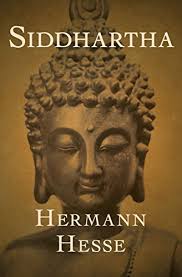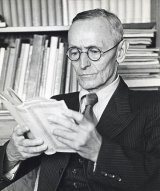Siddhartha Page #21
Siddhartha is a novel by Hermann Hesse that deals with the spiritual journey of self-discovery of a man named Siddhartha during the time of the Gautama Buddha. The book, Hesse's ninth novel, was written in German, in a simple, lyrical style.
He thought these thoughts, listened with a smile to his stomach, listened gratefully to a buzzing bee. Cheerfully, he looked into the rushing river, never before he had liked a water so well as this one, never before he had perceived the voice and the parable of the moving water thus strongly and beautifully. It seemed to him, as if the river had something special to tell him, something he did not know yet, which was still awaiting him. In this river, Siddhartha had intended to drown himself, in it the old, tired, desperate Siddhartha had drowned today. But the new Siddhartha felt a deep love for this rushing water, and decided for himself, not to leave it very soon. THE FERRYMAN By this river I want to stay, thought Siddhartha, it is the same which I have crossed a long time ago on my way to the childlike people, a friendly ferryman had guided me then, he is the one I want to go to, starting out from his hut, my path had led me at that time into a new life, which had now grown old and is dead--my present path, my present new life, shall also take its start there! Tenderly, he looked into the rushing water, into the transparent green, into the crystal lines of its drawing, so rich in secrets. Bright pearls he saw rising from the deep, quiet bubbles of air floating on the reflecting surface, the blue of the sky being depicted in it. With a thousand eyes, the river looked at him, with green ones, with white ones, with crystal ones, with sky-blue ones. How did he love this water, how did it delight him, how grateful was he to it! In his heart he heard the voice talking, which was newly awaking, and it told him: Love this water! Stay near it! Learn from it! Oh yes, he wanted to learn from it, he wanted to listen to it. He who would understand this water and its secrets, so it seemed to him, would also understand many other things, many secrets, all secrets. But out of all secrets of the river, he today only saw one, this one touched his soul. He saw: this water ran and ran, incessantly it ran, and was nevertheless always there, was always at all times the same and yet new in every moment! Great be he who would grasp this, understand this! He understood and grasped it not, only felt some idea of it stirring, a distant memory, divine voices. Siddhartha rose, the workings of hunger in his body became unbearable. In a daze he walked on, up the path by the bank, upriver, listened to the current, listened to the rumbling hunger in his body. When he reached the ferry, the boat was just ready, and the same ferryman who had once transported the young Samana across the river, stood in the boat, Siddhartha recognised him, he had also aged very much. "Would you like to ferry me over?" he asked. The ferryman, being astonished to see such an elegant man walking along and on foot, took him into his boat and pushed it off the bank. "It's a beautiful life you have chosen for yourself," the passenger spoke. "It must be beautiful to live by this water every day and to cruise on it." With a smile, the man at the oar moved from side to side: "It is beautiful, sir, it is as you say. But isn't every life, isn't every work beautiful?" "This may be true. But I envy you for yours." "Ah, you would soon stop enjoying it. This is nothing for people wearing fine clothes." Siddhartha laughed. "Once before, I have been looked upon today because of my clothes, I have been looked upon with distrust. Wouldn't you, ferryman, like to accept these clothes, which are a nuisance to me, from me? For you must know, I have no money to pay your fare." "You're joking, sir," the ferryman laughed. "I'm not joking, friend. Behold, once before you have ferried me across this water in your boat for the immaterial reward of a good deed. Thus, do it today as well, and accept my clothes for it." "And do you, sir, intent to continue travelling without clothes?" "Ah, most of all I wouldn't want to continue travelling at all. Most of all I would like you, ferryman, to give me an old loincloth and kept me with you as your assistant, or rather as your trainee, for I'll have to learn first how to handle the boat." For a long time, the ferryman looked at the stranger, searching. "Now I recognise you," he finally said. "At one time, you've slept in my hut, this was a long time ago, possibly more than twenty years ago, and you've been ferried across the river by me, and we parted like good friends. Haven't you've been a Samana? I can't think of your name any more." "My name is Siddhartha, and I was a Samana, when you've last seen me." "So be welcome, Siddhartha. My name is Vasudeva. You will, so I hope, be my guest today as well and sleep in my hut, and tell me, where you're coming from and why these beautiful clothes are such a nuisance to you." They had reached the middle of the river, and Vasudeva pushed the oar with more strength, in order to overcome the current. He worked calmly, his eyes fixed in on the front of the boat, with brawny arms. Siddhartha sat and watched him, and remembered, how once before, on that last day of his time as a Samana, love for this man had stirred in his heart. Gratefully, he accepted Vasudeva's invitation. When they had reached the bank, he helped him to tie the boat to the stakes; after this, the ferryman asked him to enter the hut, offered him bread and water, and Siddhartha ate with eager pleasure, and also ate with eager pleasure of the mango fruits, Vasudeva offered him. Afterwards, it was almost the time of the sunset, they sat on a log by the bank, and Siddhartha told the ferryman about where he originally came from and about his life, as he had seen it before his eyes today, in that hour of despair. Until late at night, lasted his tale. Vasudeva listened with great attention. Listening carefully, he let everything enter his mind, birthplace and childhood, all that learning, all that searching, all joy, all distress. This was among the ferryman's virtues one of the greatest: like only a few, he knew how to listen. Without him having spoken a word, the speaker sensed how Vasudeva let his words enter his mind, quiet, open, waiting, how he did not lose a single one, awaited not a single one with impatience, did not add his praise or rebuke, was just listening. Siddhartha felt, what a happy fortune it is, to confess to such a listener, to bury in his heart his own life, his own search, his own suffering.
Translation
Translate and read this book in other languages:
Select another language:
- - Select -
- 简体中文 (Chinese - Simplified)
- 繁體中文 (Chinese - Traditional)
- Español (Spanish)
- Esperanto (Esperanto)
- 日本語 (Japanese)
- Português (Portuguese)
- Deutsch (German)
- العربية (Arabic)
- Français (French)
- Русский (Russian)
- ಕನ್ನಡ (Kannada)
- 한국어 (Korean)
- עברית (Hebrew)
- Gaeilge (Irish)
- Українська (Ukrainian)
- اردو (Urdu)
- Magyar (Hungarian)
- मानक हिन्दी (Hindi)
- Indonesia (Indonesian)
- Italiano (Italian)
- தமிழ் (Tamil)
- Türkçe (Turkish)
- తెలుగు (Telugu)
- ภาษาไทย (Thai)
- Tiếng Việt (Vietnamese)
- Čeština (Czech)
- Polski (Polish)
- Bahasa Indonesia (Indonesian)
- Românește (Romanian)
- Nederlands (Dutch)
- Ελληνικά (Greek)
- Latinum (Latin)
- Svenska (Swedish)
- Dansk (Danish)
- Suomi (Finnish)
- فارسی (Persian)
- ייִדיש (Yiddish)
- հայերեն (Armenian)
- Norsk (Norwegian)
- English (English)
Citation
Use the citation below to add this book to your bibliography:
Style:MLAChicagoAPA
"Siddhartha Books." Literature.com. STANDS4 LLC, 2024. Web. 24 Nov. 2024. <https://www.literature.com/book/siddhartha_24>.




Discuss this Siddhartha book with the community:
Report Comment
We're doing our best to make sure our content is useful, accurate and safe.
If by any chance you spot an inappropriate comment while navigating through our website please use this form to let us know, and we'll take care of it shortly.
Attachment
You need to be logged in to favorite.
Log In